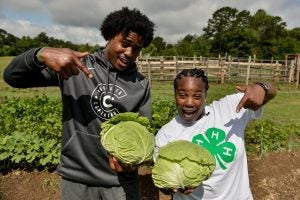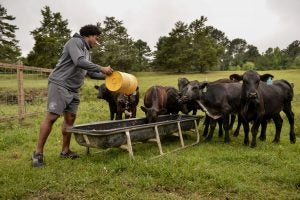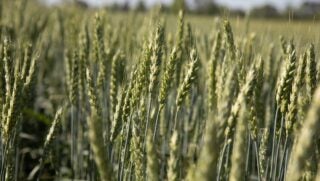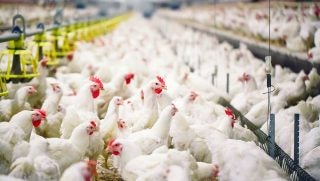4-H helped to shape his life and work ethic. Now he’s channeling those values to the next generation.
Were it not for the foundation that 4-H provided to Avery Williamson as a youth, the NFL linebacker might not have found his way back to the family farm in Tennessee as an adult.
Williamson, a free-agent linebacker who has spent the bulk of his professional playing career since 2014 with the Titans, is a fourth-generation farmer. His great-grandfather started the family legacy in agriculture, and his grandfather had a dairy farm and grew crops such as corn and tomatoes. Williamson and his father focused on cattle production — specifically black angus.
They also had three large gardens on the property.
“We loved eating out of the gardens,” Williamson said. “We had everything from watermelon, corn, peas, green beans, greens, tomatoes, onions — everything.”
It is probably of little surprise that, in the fifth grade, Williamson was drawn to the opportunity to build upon his agricultural background and to ensure a lasting support structure in this industry.
That year, a 4-H leader came to Williamson’s school in Milan, Tennessee. Through him, Williamson learned about the many different cattle breeds and what kind of traits farmers look for in each. He also began to understand body structure and handling — aspects that led him to the show ring.
“That’s what really got my interest. I knew then I wanted to do 4-H,” Williamson said. “I loved it every time he would come. Nobody else in class was paying attention — I was the only one paying attention.”

Williamson’s dad spent a lot of time as a truck driver, which led the future pro football player to run their small cattle operation by himself much of the time, including before and after school while his friends were off having fun. His time in 4-H, coupled with the responsibility on the farm, shaped his work ethic, something that has translated into success on the football field — from those early days at Milan High School onward to the University of Kentucky and then into the big leagues.
This was his job, and it took preparation and dedication.
“I’d make sure everything was done before I’d go have fun,” he said. “That’s something that sticks with me today, and I know the farm created that.”
Williamson played for four years at Kentucky, earning All-SEC honors, and was drafted in the fifth round by the Tennessee Titans. The team is based out of Nashville, only about an hour from Williamson’s family farm.
But, while it was nice to be close to home, the farm wasn’t a big deal at this point in his life. After his middle and high school years on the farm, he discovered a sense of freedom being away, not having to center his life 24/7 around his livestock.
At that time in his life, he said, “I didn’t even really want to do the farm. I didn’t at all, because getting away from the farm in college was good.”
Williamson’s father asked him repeatedly about his future with the farm, and Williamson remained hesitant to commit to anything. He had an athletics career to focus on, one that could provide for his family for years to come.
However, early on with the Titans, Williamson found out that a teammate was a cattle farmer in Louisiana who used drone technology to help manage his herd and his land. And that same fascination Williamson had learning about agriculture in 4-H was bubbling to the surface again — he saw the role technology and innovative ideas could play on a farm.
“That sounded pretty cool, because if this dude can do it, we can do it,” Williamson recalled.

In the off-season after his second year in the NFL, Williamson started investing once more in agriculture, buying some animals and equipment to add to his dad’s farm. He then added farmland.
The spark of agriculture again began to click. He saw this as blend of livelihood and business.
“This is something I really love and can make money with,” he said. “That’s when I really started to get back to it.”
Williamson is in the enviable position of having a high-profile career while also being involved in the family farm, and through a renewed partnership with 4-H, the 29-year-old is finding bigger ways to make an impact both in his local community and across the country.
Exposure to agriculture is one of the biggest barriers young people face to understanding and joining this industry, Williamson said. Most kids don’t live close to farms, and if they never have the opportunity to see one, then they won’t know whether they can love this life.
It’s especially true for minority students and marginalized communities, where a good support structure is often lacking. Too many minority kids live in places where there is no opportunity to grow anything, and it takes real effort to get them connected to agriculture.
“Showing them how to do something, not just what it is, that’s what needs to be done and what I want to do,” Williamson said.
Prior to the arrival of the pandemic, Williamson began to influence the next generation of farmers and ranchers. He hosted Joyona Helsel, an Ohio 4-H member, at his farm and walked her through a day in his life. That personal connection for growing crops and tending to animals emerged that day. It was a positive experience, showing a young person what it’s like to work for the things they want.
He recalls his interactions with Joyona as “amazing” and “genuine.”
“I could really see her enjoyment from coming out here,” he said. “It’s great getting to see people do stuff that they had never done before.”
COVID-19 put more farm visits on hiatus, but as things start to improve across the country, he’s optimistic that he can invite more 4-Hers to his farm.
“You never know what this kind of experience can do for a child or how it will influence them. It might inspire them to want to be a farmer,” he said.
In the meantime, he’s been working with 4-H on other projects. This year, he was an honorary judge for Dolphin Tank, a Shark Tank-style contest, at the National 4-H Youth Summit on Agriscience. Twenty-four of the best community action plans in agriscience will each receive a $1,000 award from Nationwide.
One of the winning Dolphin Tank presentations, for example, was a forestry mapping project that uses drone technology and augmented reality to create a stark picture of how climate change has impacted forests, species populations, marshland, and more in nearby communities. The data gathered will be compared to past data and shared with landowners and other local federal agencies. The goal is to show people what is happening in their own backyards to motivate them to reduce their carbon footprints.
“If you have a dream to do something, don’t give up on it just because you don’t have access to it. Continue to research. There are a lot of different ways to get involved in things, whether it’s through the computer or reaching out to someone at school,” Williamson said. “Kids can really learn a lot today when they have access to things.”
Ryan Tipps is the founder and managing editor of AGDAILY. The Indiana native has a master’s degree in Agriculture and Life Sciences from Virginia Tech and has covered the food and farming industries at the state and national levels since 2011.



